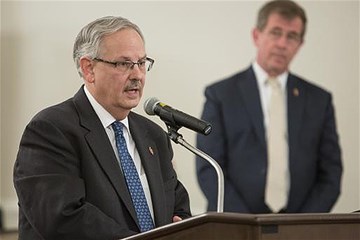For two hours, The United Methodist Church's Judicial Council heard arguments about how confined the agenda should be for the special General Conference.
The first Judicial Council oral hearing to be livestreamed featured bishops taking different positions on whether only petitions consistent with the Council of Bishops' own recommendation should be before the special General Conference, set for Feb. 23-26, 2019, in St. Louis.
The Council of Bishops requested a declaratory decision of the Judicial Council on whether petitions inconsistent with the bishops' own report can be considered at the special General Conference.
Texas Conference Bishop Scott Jones acknowledged that the special General Conference is to be confined to consideration of the church's current division, but said it should be open to any related petition brought by clergy or laity.
The Commission on General Conference declined to take a position, Rev. Gary George, member of the commission, explained as he read from its own brief to Judicial Council. The commission said it considered its role "as one of implementing the actions and logistical responsibilities determined by the General Conference," rather than defining what legislation goes before the 2019 special session.
The Rev. Keith Boyette, president of the Wesleyan Covenant Association, an unofficial advocacy group, argued that any petition related to the "underlying conflict" would be in harmony with the call of the special session and should be allowed for submission. Such petitions need to be translated and printed in advance to give time for reading, understanding and debating, he stressed.
Stephanie Henry, a lay member of the Upper New York Conference who said she was a young adult who had recently moved to Seattle, believes allowing multiple petitions "would be disruptive" to the purpose of the special session. General Conference 2016, she said, "approved a different way to move The United Methodist Church forward."
John Lomperis, who said he was a young adult and Indiana Conference delegate to the 2019 General Conference, supported the submission of other petitions, and noted that just as the 1966 special session of General Conference was able to manage its work in four days, "So can we."
Thomas Starnes, chancellor for the Baltimore-Washington Conference, spoke on behalf of a group of annual conference chancellors believe both the denomination's constitution and authorization by General Conference 2016 allows for limiting the agenda.
Opening up to a flood of petitions would "nullify" the purpose of the special General Conference, Starnes told the council.
The purpose "is not simply to receive a report and act on it any way one might choose," he said. "It is to receive a particular recommendation from our bishops … on how we can stay together."
Plowden zeroed in on the church law requirement that legislation at a special General Conference be "in harmony" with the specific call for that General Conference.
Linda Bloom, New York-based assistant news editor, Sam Hodges, Dallas-based writer for UMNS
One of seven apportioned giving opportunities of The United Methodist Church, the General Administration Fund implements trustworthy administrative oversight, supports the legislative processes of the church and curates The United Methodist Church's rich history. Please encourage your leaders and congregations to support the General Administration Fund apportionment at 100 percent.





